"May you be needed by your society"
A conversation, with C. Bain and C. Thornton, eventually about Care Crisis Yoga
This April, at the Casino for Social Medicine, we ran a project called ASMR, which stood for Anarchist School of Medicine and Revolution, organized by Magda Hartelova and Florence Freitag. For four days, caregivers in many forms offered health support for free, with many people sitting at concurrent help desks. People walked in off the street and met somebody at the front desk, and they directed them to a help desk, maybe for flower essences or physiotherapy, Mongolian Shamanism or pediatrics, for free. Every night at 9pm I taught a Kundalini yoga class that was also a lecture about the care crisis that tried to bring the ideas of the larger Casino project (to ensure that all care givers are cared for as a way to completely reorganize society) together.
Pictured above, C. Bain (http://tiresiasprojekt.com) thoughtfully interviewed me about this weird “art?” for the ASMR newsletter while we walked in circles around Templehofer Feld in Berlin, eventually achieving kimchi fries in what felt a bit like the suburbs. Below is a longer version of the interview that will come in the ASMR newsletter, edited first by Bain and then by me. We discussed:
The Care Crisis, body-talk-show
April 2-5, 2025
Casino for Social Medicine
Racial capitalism is a care crisis. Berlin is our hospital. Caregivers are pirates. Solidarity is policed. ADHD is climate change. We are nature defending itself. This talk show involves a conversation with your body about the crisis of care, which is as big as our burning planet, and as tiny as the feeling you don't know how to share with anyone.
CT: What the heck are these things right there?
CB: Those things?
Yeah, those shapes.
I don't know this.
This is funny, how controlling. They're trying to organize us.
… also I see shit at [a German art school] where I'm like, the institution is doing you a disservice by allowing you to think that you can do this, like these, like encyclopedia-based projects with all these ethnographic images by white German dudes. You simply cannot in the real world. And even to want to make work that looks like this means you're deeply misunderstanding what the thing is and what it's doing.
When I look at that type of man-encyclopedia-global-culture-DJ-art stuff, at this point, the whole premise is so hard for me to understand. This is people's reality right now? It shouldn't be happening, and it's so far from what should be happening that it feels surreal.
Today, I spoke with this woman who's studying global tourism and resorts, resort culture. I've been working on a lot of different projects about spas, oh god, for a decade? I think spas are a place to witness cultural appropriation, and but also jamming the Spa has been my most hilarious project. It's like my place to terrorize people gently from the side. Part of what I'm really interested in spas in Europe is the relationship between the spa, specifically island spas and spa resorts, and how they relate to detention centers. They kind of look the same. I got quite committed to the relationship between spa tourism and migration, very interconnected. And the reason I'm saying that is that the stuff around cultural appropriation and shared cultures, the blurring of cultures, is actually getting so weird right now. Carceral culture and healing culture do touch somewhere close to where escaping reality meets disappearing people to the periphery.
When I went to do a residency about plants and dreams a couple years ago on Kos (Greek Island), I looked up the island, and there's a migrant detention center there. So when we got there, a few of us were like, could you drive us there? On the way there, I pointed to these buildings that were covered in barbed wire. And I was like, “Oh, those look like kind of nice detention centers,” right by the ocean. And they were like, “no, no, that's a spa resort.”
And then we kept driving, and then we saw another thing that looked just like it, but a little bit worse and with slightly taller fencing, and that was the detention center. The culture jamming is so weird. Here many Syrian people are living on a beautiful tourist island in Greece, but they can't go to the beach, or move or leave. The reason for the taller barbed wire at the detention center, that I heard, are that the more nationalist Greeks would attack the new non-Greek, non-tourist people there. So then the people running from war are contained in a prison on a beautiful island near the ocean that they can't access. And the tourists get a reminder of the human sacrifices made for their pleasure.
Well, let me drop a third element in there, because, have you talked to Anna about how, since she got back from Palestine, she's having these more authoritarian leanings? She's becoming authoritarian-curious. She's like “We have lost these people culturally. What are you going to do? You need propaganda. You need the state to control the media apparatus. Or else, maybe you have to kill them.” So I'm like, do you mean they should be re-educated? Perhaps in some sort of camp? I'm open to it, honestly.
Spa re-education is my plan; the Social Spa for Collective Mutation was my project in Switzerland for the most privileged people on Earth. Like a place you can go when you know you need to change, but you don't know how. And we punish people there gently because that's what people (don't know that they) actually want. Rich people do violent things to each other and call it therapeutic all the time. So, why can't we organize that from below and do it for a reason? Like out of hope. Like out of class war.
And political education is so anemic. Every time someone says something optimistic to me about the US, I'm like, I don't know, buddy, because people just don't fucking know what's going on, there. People who are in the trauma activation, or people who aren’t interested, like, they don’t care because they aren’t directly affected yet.
It's wild. Two people have said to me the US probably has the most radical politics in the world right now, and I don't even know what that means. Radical as in, actually really straight forward class war?
I also literally do not know what that means.
Perhaps we should try to address more directly, the cultural appropriation of yoga.
Yeah, yeah, I love talking about it. In terms of cultural appropo, I'm mostly bored by people's fears of fucking up around it. I feel like cultural appropriation, while I understand its potential and frequent violence, it also feels like another way for white people to police other white people.
The thing that I said at the beginning of the all the Kundalini yoga classes is this was actually part of a pyramid scheme, based on cultural appropriation, organized and designed by an Indian economist who stole from a bunch of traditions and wanted his brand of yoga to bleed into upper class Ivy League educated American hippy culture.
https://www.3ho.org/yogi-bhajan-our-founder/
When people think about cultural appropriation, we're often imagining that the people who were appropriated from are victims. And I just would like to give people a little bit more credit than that. Like, Yogi Bhajan was a kind of dangerous, dangerously good, salesman and marketing strategist with a real plan. He definitely stole a bunch of stuff. Then he packaged it so that we would appropriate it. He wanted it to be like a virus. I don't think all his intentions were bad. And I don't think he is unique in this forceful yoga marketing strategy.
And, how did you come to this framing, this, would you call it an art practice?
Yeah, I don't know what else to call it. I mean, first I went to some Kundalini yoga classes 20 years ago in New York, where my whole body seized up. It was the first time that I really felt out of control in my own body. I did it, but I couldn't undo it. People had to get on top of me to straighten me up after I curled up into fetal position, and my fingers turned into claws, my face all bunched up. It was one of the most memorable physical experiences I'd ever had. It was like a temporal reset and after I did that, that night, I met somebody who became my best friend for ages. It was really an important moment in my life. I began to hold Kundalini yoga as quite a powerful thing. I didn't know exactly what I wanted to do with it, but it felt like a tool that I would one day use.
Then, when I was living in California, later on, I was doing this alternative credit reporting for people that were losing their houses because of tech gentrification as well as anti-eviction organizing, and organizing around different kinds of debt with Strike Debt. I got really involved in feeling and describing the psychosis of US economics, how predatory it was, how predatory we were. I thought that dealing with the nervous system was maybe one of the only ways that you could get out of the social, emotional and imaginal field produced by the US brand of the global economy.
My weekly struggle with algorithmic credit reporting, one case at a time, in Oakland CA
Because I started to see how in very material ways, the economy touched every part of our body. I think that's obvious now, but I don't think it was obvious then. So I started taking yoga classes, to deal with my own shit and my own fear of poverty. It was, it is, really hard for me to figure out how to make money. I was so afraid of being poor or homeless or dying of neglect like so many people do.
And then my dad died.
And I hit a wall about what to do with my life.
So I got a payday loan to go to Kundalini yoga teacher training.
And this was around the first rise of Trump, he was starting to run for president. So I was in Kundalini yoga school, the teacher (Sat Santokh, RIP) was one of Yogi Bhajan’s first students. He had been the tour manager for the Grateful Dead in the 60s and 70s. A pushy, arrogant, but kind of radical guy. Most of the students were traditionally self-centered, just doing the normal yoga-self-talk stuff (not saying I am above it!). We had class every two weeks, and had a practice we did in the interim. In one two week period we had to do this really intense abdominal work every day. 15 minutes of holding your legs 60 degrees off the ground, while you're laying down and breathing real slow and calm. The group was very intergenerational in the yoga school. When we came back after two weeks, everybody had quit their jobs, left their abusive partners, given up the housing they couldn't afford. Everybody just dropped the bullshit in their lives and became super hard to fuck with. And I thought, that's what I want. Collectively strong abs. It really crystallized something.
Then I had to do my practice teaching, in order to graduate, to teach something to the group. And I did that exercise that I've taught twice at Casino, where you go through the wall, that I did on the first day the care crisis series, where the wall was the thing keeping us from stopping the genocide in Gaza. But at that time, I did it with a wall about Trump, and the border between the US and Mexico. I had already started to try to combine political ideas with the physical possibility of breaking through it, through this. But everybody in that group hated it so much! I got lambasted for adding political content to it, and that was the best thing. I pretty much got booed out of the room. The teacher hated it, everybody said “you really can't do this.” And so I left feeling like, “this is exactly what I want to do.”
One of a series of attempts to make a serious/prank yoga video— in this one you can go through a wall of financialization
So I started to go to yoga studios and get jobs as a substitute teacher, so I could go in and try it out. And then I got obsessed with trying to slip in and use corporate yoga studios as a place to give people the abs that make them go and destroy everything. And also, sometimes make them feel bad (reading from Cruel Optimism on NYE), or talk about the world that they're contributing to, the racism and incarceration and economic exploitation (reciting Assata Shakur together). Over the years— I did it for a few years—I would also go to the art world to do it. At that time it was all very antagonistic. I was really into punishing people. I was angry.
Not everyone, but quite a lot of people wanted to be punished. So I made the classes really hard, and I gave people the bad news. But also, I tried to give some sense that we were doing it for a reason. By the end of the hard work and the discipline of looking at the bad news, understanding you're a part of the bad news, you're complicit, at the end, we could reach a point where we could dream. We could take a deep breath and imagine, with a clear head and heart, what it would be like if everybody, even the most annoying person in your life, had access to high quality housing and healthcare and education?
An advertisement I made when I taught yoga at Lakehead University in Canada
And then I had to put it to bed. Because it didn't really feel like the right joke anymore. Yeah, I think there's something about getting older, being a white woman, being a white American woman, that meant people couldn't discern how real it was, or how much of it was a stunt. I put it aside.
It was trying to be an intervention, trying to be a good white person, using privilege as a weapon. I don't know if it really ever worked. Maybe it wasn’t successful in a way that transforms the people that were like in the room, exactly. But I think it did set a precedent for something about weaponizing self-care.
Below is a great example of how to take self care/exercise culture and make it functional for our times! Just a small inspo that I have nothing to do with.
Anarchist Calisthenics: (thank you Raoni)
And how did it feel, doing it for a week at Casino, in terms of being successful or the “wrong joke” or something like that?
It was really hard.
You tried to cancel basically every day.
Yeah, it was too much to do it every day. It's the kind of thing that I would I would prepare for over six months, for one session, and then I would teach it many, many times over again and get really good at it.
It’s just very different to do it for your friends, or for people that are your everyday community than it was to go into war, which is what I was doing when I was going to yoga studios and museums. So this was almost like a completely different thing. At Casino I was being a friend or a sister or something like that. Trying to bring together some sense of context for why we're doing this community care stuff. It's not that the end is just that we all feel better, but we're building towards something. I really wanted that to come through. So I was quite overwhelmed with a sense of the pressure trying to close every night in a way where things made sense, sort of spiritually, in terms of what we're doing.
Photo from John Kim, of Care Crisis Yoga @ Casino
But generally, I actually loved it. I remembered that I'm a real Leo (moon). I like to sing and dance in front of people. I did a lot of improvising, because I was just literally losing my mind about what was happening in Gaza. I didn't have access to my brain. But an interesting thing was that, I didn't have access to my brain, but I did it anyway, and through using my body my brain (at times) came back. That's cool. And it was interesting to do that in front of people.
It was interesting to do a lecture, while djing, and teaching yoga, when it was not all honed. It wasn't put together at all, most nights. And yet I did it, and people did it with me. It was much more like doing it with people than the other times when I've been doing it to people in corporate yoga studios.
I have a question about the difference between facilitation and practice. What is your sense of this? Do you feel like when you were punishing everyone, that you were also doing it, you were also punished?
Yeah, I think I was punished in different ways. It's taken a long time for my work to transform me in this way (as in The Hologram), where what I'm doing to everybody, I'm also doing to myself. I might have been doing it to myself when I began teaching yoga this way, somehow, but I think I also had a really big desire for vengeance.
I'm sorry. I need to make sure that this grown man is doing
[White german man in nice khakis and a polo shirt plays with a large remote controlled car]
It's definitely happening.
Okay, good to make sure
May you be needed in your society.
Okay, so revenge, hedge fund managers—
I was really into revenge. I worked really, really hard to figure out how to teach that in yoga. And I would really belabor my script, and memorize it, out of an intense will to make people hurt on a way to transformation.
And now it's just very, very different. This new version of teaching yoga is out of love, not revenge. I don't think I necessarily benefited from the yoga 100% at Casino, maybe only 50% and then 50% is like, I loved holding space and seeing people synchronized. Seeing people synchronized always makes me cry. So I cried in front of people. Synchronized music, with text, with movement, it sometimes really works. It's immediately energizing for me. So being the facilitator does give me a ton of the chemicals.
The other thing that I got a lot out of was feeling that I have an intuition, and making a proposal based on that. My proposal with the care crisis is that it's both too big and too small to talk about. When I was doing research around it, I actually couldn't look at it, it was so difficult. I found the information I wanted, and then I couldn't see it.
And what was that information?
Like, the number of healthcare workers that died in war, that was the first one. More professional caregivers died in war in the last two and a half years than had ever been recorded. Of course mostly thanks to Israel. And then, looking at climate disasters. There's so many more climate disasters than I knew, and they’re so much more serious than I could possibly get my head around. I'm not sure any human can hold an imagine of so many different types of overlapping emergencies at once and what the aftermath is.
Originally I wanted to do each day about a different place, and how it was dealing with the care crisis. But then when I started to look at specific places, all the medical systems are just completely insufficient for the scale of disasters that are here. Most of the places where there's massive climate disruption, there's also massive corruption, manipulation from our beautiful community called the US, resource extraction, and long term colonial violence. For a week I got this refreshed window into the world that blew my mind.
I guess this is like a race, but I'm glad that they leave out the tiny cars for the little men.
So I wanted to know if there was a way to handle brutal information, something so personal and also so large-scale. If it would be possible to work with this material through movement and manipulation of our different bodily systems. And I don't think I got a full answer, but the partial answer is to do this combination of lecture and challenging repetitive movement and music, to do more of this. I think there's something useful in it.
This is from a warm up I led at a recent event with Alexis Shotwell about Ursula Le Guin and Anarchist organizing
I know you’re critical of the distance between symbolic and real action, and the distance between art and politics. And i wonder, because a visualization is symbolic, right? What you're doing to the wall is a symbolic action.
I mean, I actually do Kundalini yoga. It's quite embarrassing, but I really do an hour, an hour and a half every day in the morning. I used to do it at five in the morning every day for like two hours. But I think, there's something about mixing the symbolic /the visualization with certain qualities that Kundalini yoga provides. In Kundalini you do a lot of difficult, repetitive shit for a long time. There is something that happens when you do something that is harder than you thought you could do, for longer than you thought you could do it. Do that a lot over time, and you’re growing your patience, your sense of what's possible, sometimes while visualizing. Or when I teach it, you are hearing a bunch of stuff that's too hard to process, and along with the physical activity, it does something. Maybe you digest more than you usually can. In Kundalini, there is all this stuff that makes you tingle. Did you tingle at all in the class?
I'm sure, yeah.
The rhetoric is that's the tingling is your nervous system transforming. I don't really know what the tingling is. But if there's a strong sensorial experience with information or with visualization, it's got to do something. Like EMDR, something about mixing ideas or memories with repetitive movement.
And there's something about straight up doing something hard together, physically hard, that might balance out a hard idea or something that's difficult to process intellectually, or more information than you can handle, or whatever. There’s something cool about trying to use your body to metabolize the information. I have a lot of faith in it, and yet, no one's really done it to me, so I don’t know what that's like.
The first time I taught yoga at the Casino was the best. It was before, a couple weeks before ASMR. It was in the morning.
Photo from Elizabeth Foundation Project Space, NY
I remember! I couldn't get there.
It was so fun. And I prepared for a while, but not so much. It was about beauty, and it was made of so many conversations that I had with people who were there. I brought really cool poems (a LOT of Cassandra Troyan) and music, it was so fun to actually design.
Like a little experiment. It is like a performance lecture where you get to DJ and make people dance around. It was just so fun and glorious. And you could tell, everybody really hung out after, like deeply hung out.
Nice.
Yeah.
Yeah, yeah.






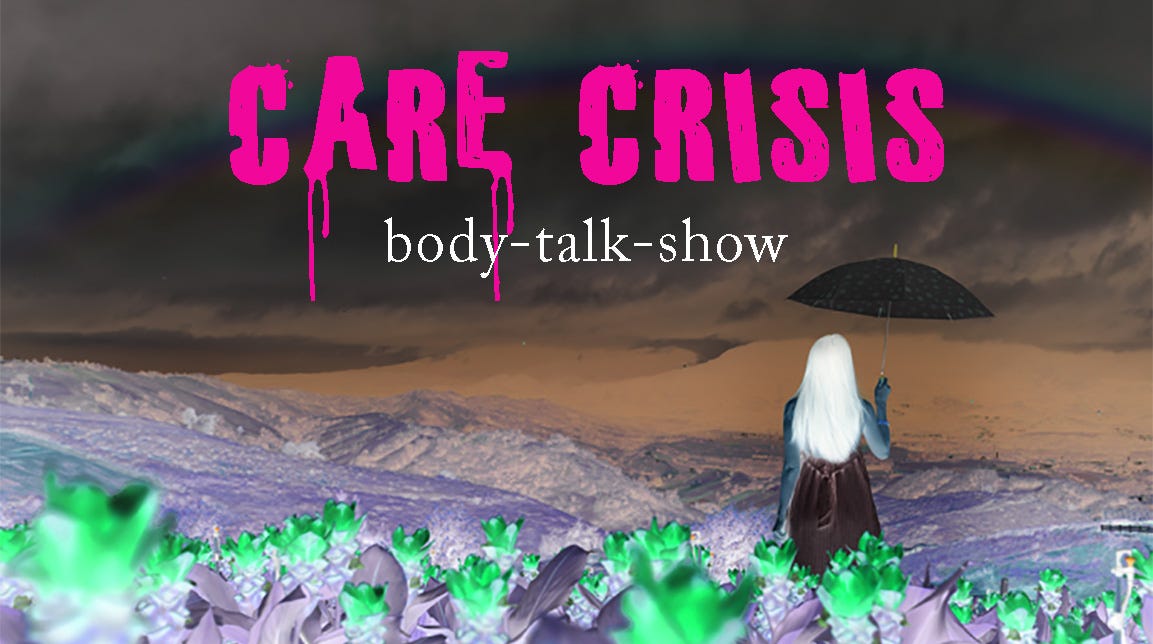

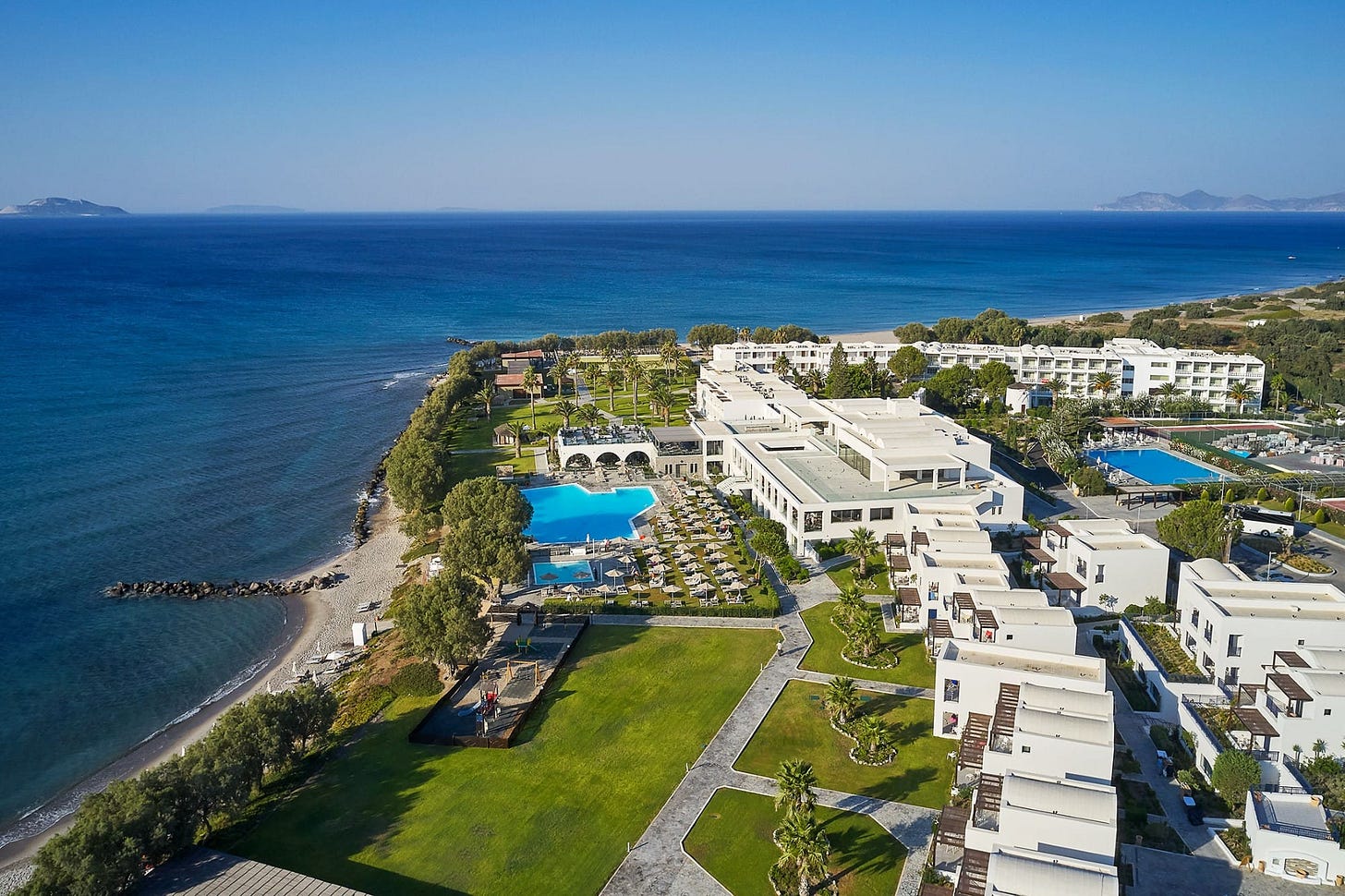

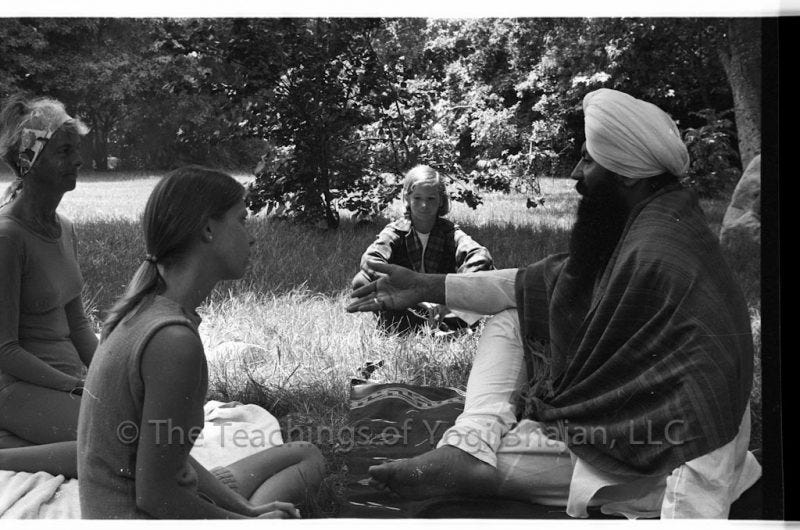

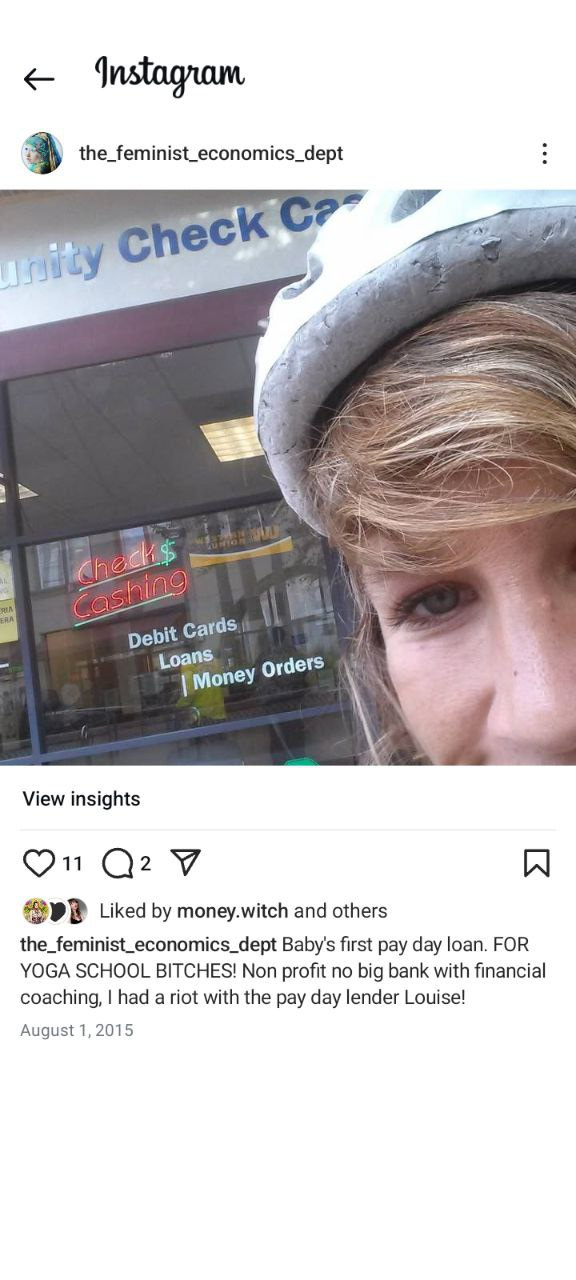
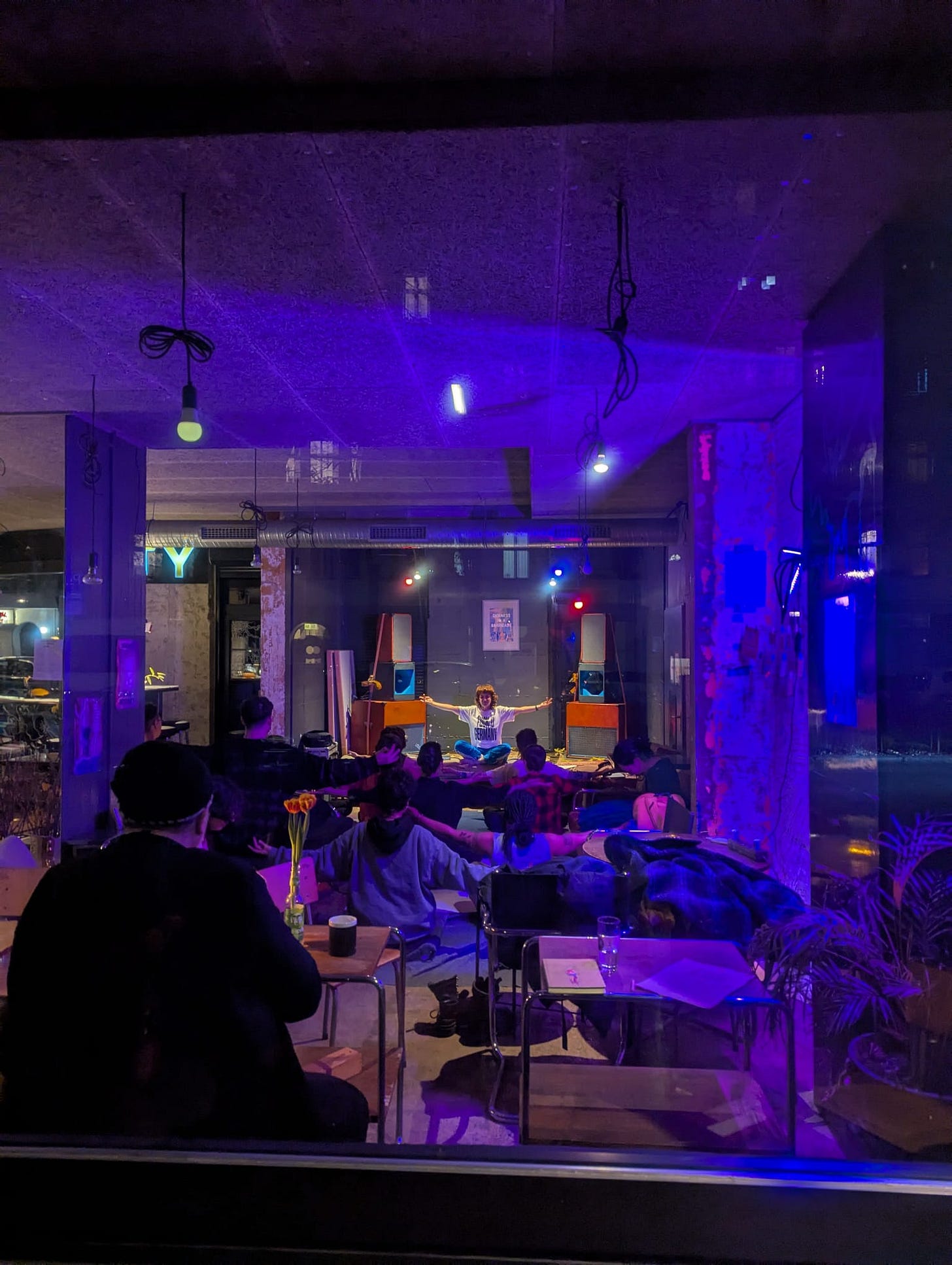

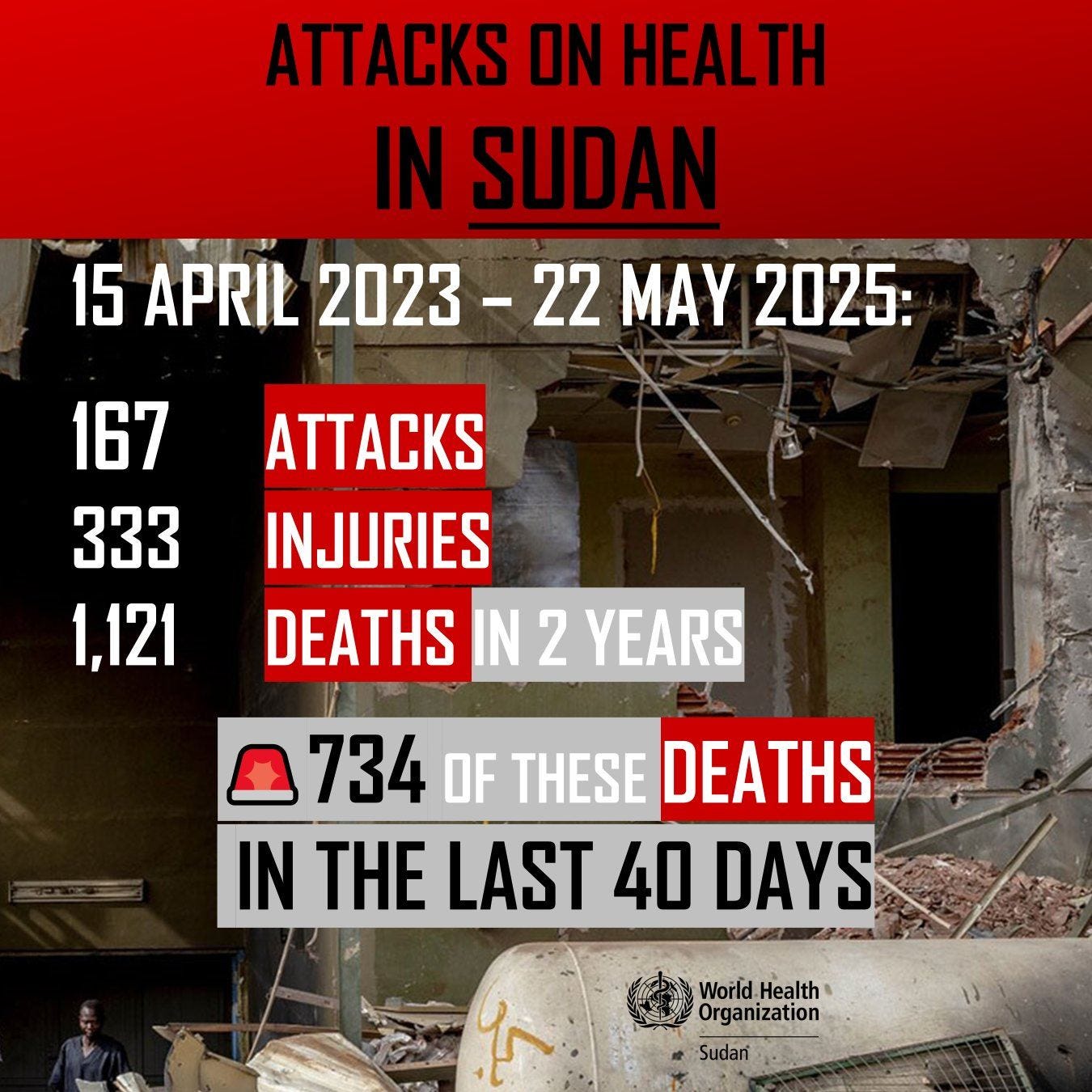



Thank you for sharing this 💖 Authoritarianism isn't it, friends 🫂